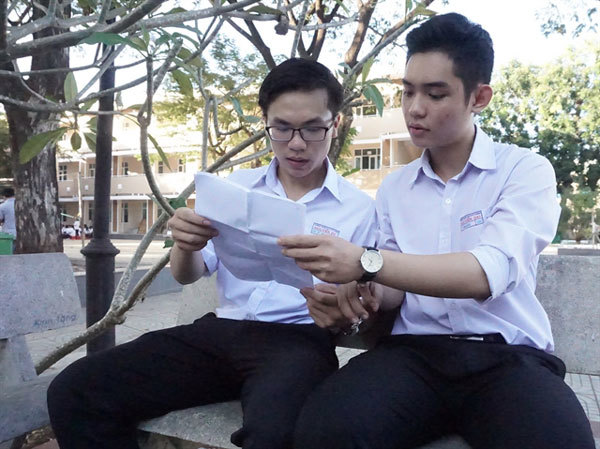 |
|
Students at Nguyen Du High School attend a roundtable meeting on the importance of organ donations.
|
Hung and his close friend Dinh Huu Thien Phuc, an 11th grader at the school, have been working for months on a research project that raises students' awareness about the value of organ donations.
Their project has received a positive response from teachers, students and officials.
“We wanted to do something to spread the good will and compassion shown by organ donors, who help to save other people,” Hung says.
The two students say they were especially inspired by the story of a seven-year-old girl from Hanoi who died of a brain tumor last year and whose corneas were donated for transplant operations in two patients.
Watching An’s inspiring story on television, Hung and Phuc were motivated by the girl’s desire to help people who are waiting for a transplant.
In March last year, they began conducting a survey on how high school students view organ donations and then made videos on organ donations and transplants.
“After doing further research, we discovered that very few students know about organ and tissue donation. Music idols and games draw the interest of most students," Hung says.
The two students are also active in roundtable meetings and social media platforms where they talk about organ donations and encourage people to register as organ and tissue donors.
"When I first began talking about this, my grandmother and father resisted it. My father refused to donate his organs because he wants an intact body after burial," Hung says.
"My other relatives said they hated the idea of cadaver manipulation."
 |
| Students Pham Hung and Dinh Huu Thien Phuc from Nguyen Du High School in Ba Ria Vung Tau Province have worked for months on a research project that raises students' awareness about the value of donating organs after death. |
Educational campaigns
Nguyen Thi Thuy, the students' research supervisor and a technology teacher at the school, says that she appreciates the message they are spreading about the value of organ donations.
With Thuy’s guidance, the students have received advice about the organ-donation process and the law from experts at Cho Ray Hospital’s Unit for Co-ordinating Human Organ Transplants in HCM City.
Du Thi Ngoc Thu, head of the unit, says: “I was really surprised when teachers and students from the school came to the hospital to seek information and consultancy. It was the first time I had heard about research done by high school students on raising awareness about organ donations.”
“I hope that it will help lay the foundation for cooperation between the Ministry of Education and Training and the Ministry of Health to include education about organ and tissue donations in extra-curricular programmes at high schools and universities,” Thu says.
“The law prohibits anyone younger than age 18 to donate their organs after death. However, students can learn at a young age about organ donation and transplant operations. This can change their attitudes and they can be ready to sign up for organ donation when they're adults,” she adds.
Nguyen Van Tam, rector at Nguyen Du High School, says a wide range of educational activities about organ donations were held over the last year, including a story-telling contest, round-table meeting, and acting in school plays.
Many teachers have also been inspired and have decided to donate their organs after death.
Thúy, the students' supervisor, was the first person at the school to sign up to donate her organs after death, followed by 19 other teachers.
Last week, Du Thi Ngoc Thu, head of Cho Ray Hospital’s Unit for Co-ordinating Human Organ Transplants, gave out organ-donation cards to teachers at a roundtable meeting held at the school.
 |
|
Du Thi Ngoc Thu, head of Cho Ray Hospital’s Unit for Co-ordinating Human Organ Transplants, gives out organ-donation cards to teachers at a roundtable meeting at a school in Ba Ria-Vung Tau Province.
|
Mai Thi Mai, a teacher of civic education at the school, says: "Organ donation is a meaningful action that anyone can do to give life to others. I'm really pleased to support this project and spread the word about its importance."
Nguyen Hung Anh, a 12th grade student at Nguyen Du High School, says that "We can live ‘another life’ even after our death".
"I'm ready to sign up as an organ donor when I get older."
In Vietnam, more than 10,000 people suffer end-state organ failure, which can only be treated with an organ transplant, according to Thu.
Organ transplants in Vietnam depend heavily on donations from live relatives due to a dire shortage of organ donations after death. — VNS
Thu Hang

Report: 521 organ transplants performed in Vietnam in 2019
Vietnam successfully performed over 4,200 organ transplants as of August 31, 2019, while the total number for this year so far being 521 cases.

Over 650 Buddhist monks, followers register for blood, organ donation
More than 500 Buddhist monks, nuns and followers registered for blood donation while 150 people put their names on the list of organ donors at a festival in Hanoi on August 4.

Father overcomes prejudice to donate organs, saves seven
When Pham Van Thu decided to sign papers to donate the organs of his brain-dead son two weeks ago, he did not think he would have to deal with disapproval from those around him.
 "Organ donations can give life to others. Donating is a good deed we can do after death," says Pham Hung, a 12th grader at Nguyen Du High School in Ba Ria Vung Tau Province.
"Organ donations can give life to others. Donating is a good deed we can do after death," says Pham Hung, a 12th grader at Nguyen Du High School in Ba Ria Vung Tau Province.